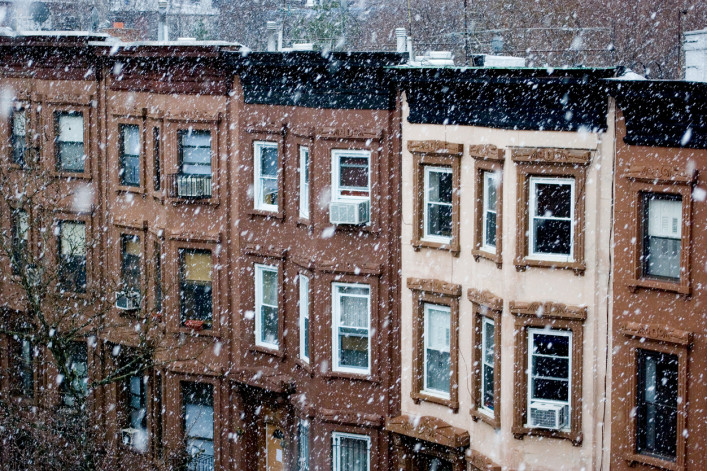Does calling 311 when you don’t have heat really work?
- If you’re having trouble getting an inspector to show up, enlist your neighbors to contact HPD
- Reach out online or via the 311 app to better track and document your complaints
- Indoor temperature must be below the legal threshold for your landlord to receive a citation

You may need to make more than one 311 complaint to get the city to respond.
iStock
Does calling 311 really work? My building had barely any heat in October and November, even when the temperature dropped into the 30s at night. My neighbors and I have called 311 multiple times and no inspector from the city came. How can I get them to respond?
New York City is supposed to send an inspector to investigate your heat complaint, at least that’s how the system should work. If you’re having trouble getting their attention, there are a few things you can do, according to our experts.
Usually, the Housing Preservation & Development Department is fairly responsive when it comes to complaints about a lack of heat in an apartment or building because those are more serious violations, says Sam Himmelstein, a partner at Himmelstein McConnell Gribben & Joseph (and a Brick sponsor FYI).
A lack of heat or hot water is a Class C violation, meaning it needs to be addressed immediately and can result in fines of $350 to $1,250 per day for your landlord. HPD visits apartments "as soon as possible to inspect conditions and issue violations where necessary to ensure all New Yorkers feel safe in their own homes," says Natasha Kersey, a spokesperson for HPD.
But it's worth being prepared for a drop-in. HPD will only place a violation on your building if the temperature is illegally low when they arrive, Himmelstein says.
“If by any chance when they arrive and the heat is above the required [temperature] they won’t place a violation,” Himmelstein says. “They'll only place a violation if at the time they arrive the heat is below the minimum.”
A representative for the HPD did not immediately respond to a request for comment.
Set the record straight
Your first step should be to measure the temperature inside your apartment during “heat season”—the period between Oct. 1st through May 31st where your landlord has to heat your apartment above a certain level. When temperatures outside drop below 55 degrees between 6 a.m. and 10 p.m., your landlord has to heat your apartment to 68 degrees. At night, your landlord has to keep the apartment at 62 degrees regardless of outdoor temperatures.
Himmelstein recommends keeping heat records using a thermometer to monitor indoor and outdoor temperatures, and then to file a complaint with 311. You can do so by calling 311 and speaking to an operator, file a complaint online, or make one through the 311 app.
Contact 311 online, by phone, or both
It can be helpful to use the app to track the status of your complaints online, plus other city sites to keep tabs on issues in your building, says Christopher Tarnok, a partner at law firm DL Partners. He’s also a Brick sponsor FYI.
Tarnok recommends reaching out online to 311 to get the city to respond. After you file a complaint, you will receive a service request number, which you can then use to follow up on your complaint through the online portal.
After HPD receives a complaint, the agency contacts the owner of your building and may contact the tenants to see if the landlord has resolved the issue. If officials are looking into multiple complaints about a building-wide issue, they may send an inspector to take a look, according to HPD.
An HPD inspector should place a yellow card in your building's entryway to indicate that they visited your building, or you can check HPD online. They should also check your building's smoke detectors and carbon monoxide detectors during their visit, according to HPD.
One renter, we’ll call her Eve, has been filing 311 complaints for the past month because her landlord refuses to fix her heat in her Brooklyn apartment. (Eve requested anonymity because she’s still complaining to 311 about her landlord). She recommends calling HPD directly to explain your situation to an official at your borough’s service center.
“I’ve called them in distress before because it's so stressful to be dealing with this,” Eve says. “When I call them they talk like they're on the side of justice. It feels like they care about tenants rights.”
Prepare for a visit
Still, her experience hasn’t been perfect. Eve has had inspectors arrive at her apartment and not issue a violation because the temperature in her apartment wasn’t cold enough to land her landlord in trouble or because she was not present to let them in.
“We would call and they would come and it would be one degree too warm, and they would say, ‘well there’s nothing we can do,’” Eve says. “For weeks we were playing this game with them.”
She recommends scheduling an appointment online with HPD and, ironically, not using alternative methods to heat your apartment so that HPD can issue a violation, though appointments may be limited. For example, she turned off her space heater ahead of her appointment.
Get organized
Time-tested advice when dealing with building-wide issues is to rally your neighbors and make complaints as a group. If you keep complaining, HPD might initiate a case against your landlord, called an HP action, to force them to turn the heat on through the Housing Court system, Himmelstein says.
“Typically HPD will not initiate their own case unless it's an ongoing problem and they have multiple complaints, and then there are times when the department will start an HP action in housing court to correct [a problem],” Himmelstein says.
You and your fellow tenants could also contact your local city council person who can then reach out to HPD to speed up a solution, Himmelstein says. It’s best to gather a group because the more tenants you have, the more voters you represent.
Trouble at home? Get your NYC apartment-dweller questions answered by an expert. Send your questions to experts@brickunderground.com.



























